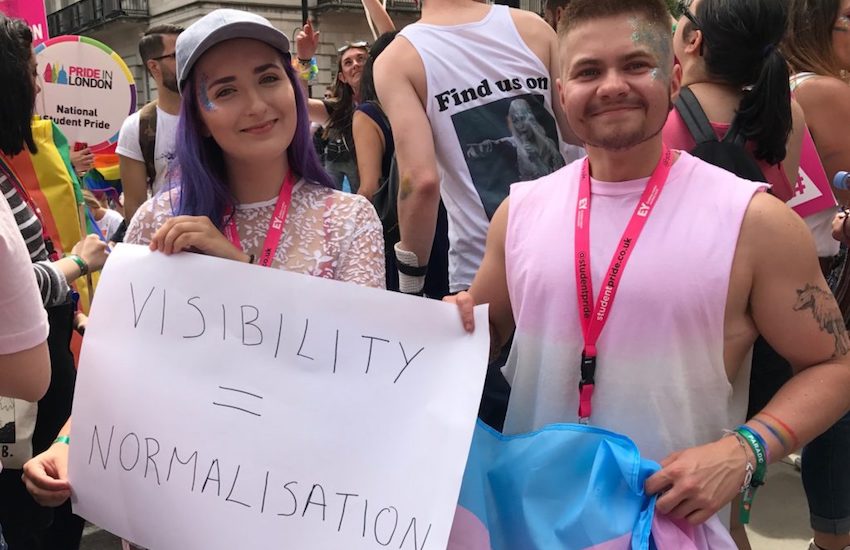National Student Pride walk in the Pride in London Parade 2017 | Photo: Gay Star News / Jamie Wareham
4 in 5 young LGBTI people studying in the UK say they are struggling because they aren’t getting enough help from their university.
New research from Student Minds says LGBTI students need more support that is ‘inclusive and culturally competent.’
The report, ‘LGBTQ+ Student Mental Health’, out today is based on the responses of 467 students, graduates, and Student Union representatives.
In the UK, LGB adults are more likely to face mental health woes. They are also more likely to have a lower well-being in comparison to straight people.
Nearly 1 in 2 trans people try to take their own life.
The research found that four in five feel ‘there is a need for further support for LGBTQ+ students.’
Because of this, LGBTQ+ students are most likely to seek help or advice for emotional problems from their friends over professionals, parents or even helplines.
Does the LGBTI community on campus need to change too?
Over a quarter of students (28%) do not feel engaged in their university’s LGBTQ+ community. Over half (54%) also feel unable to engage with their local LGBTQ+ community too.
Co-author of the Student Minds report Dominic Smithies tells GSN:
‘Being a part of the LGBTQ+ community is an important factor in helping individuals build their resilience.’
The report notes that:
‘Respondents suggested that LGBTQ+ societies and representatives were not always warm, friendly and welcoming. The leadership of LGBTQ+ societies are seen as ‘cliquey’ and exclusive.
Student Mind’s report says societies with a focus on drinking and partying shut out students looking for a supportive space.
NUS LGBT+ Officer (Women’s Place), Eden Ladley tells GSN, the report raises serious concerns:
‘There is a clear need for educational institutions to provide culturally competent and well-funded mental health support. Especially around body image, eating disorders and trauma.
‘Students’ Unions also have a key role to play in facilitating the provision of LGBT+ peer support services. The NUS LGBT+ Campaign will be supporting LGBT+ societies in students’ unions to better provide that support.’
The report shows nine in ten want the university to provide a peer support programme for LGBTQ+ students.
Many of the students also call for Universities to prioritize help for LGBTQ+ societies, which are often underfunded and poorly supported. Other responses include students calling for ‘raising awareness’, ‘improving support services’ and ‘wider policy work.’
How can Universities respond?
Commenting on the research, Rosie Tressler, CEO of Student Minds says they want institutions to put LGBTI students at the heart of their change-making process:
‘Programmes of change are occurring nationwide, with increasing numbers of Vice-chancellors taking on mental health and wellbeing as a strategic priority.
‘LGBTQ+ students must be seen as an opportunity. Place them at the heart of the solutions – enabling all to thrive whilst at a university.’
One new trend that tries to emulate this style of peer-to-peer support is LGBTI only student halls.
The University of Sheffield is the latest to follow Birmingham University’s lead in launching accommodation specifically for LGBTI students.
John de Pury, mental health policy lead at Universities UK, welcomes the report:
‘As part of a whole university approach to mental health, it’s important that universities identify, engage with and support vulnerable minority groups, including LGBTQ+ students and staff.
‘In addition to culturally competent student support services, peer support groups are a good way of encouraging inclusivity and building communities. Universities see mental health as a priority and partnership. Working with students and staff is vital if we are to help everyone to thrive.’
Read more from Gay Star Students:
Gay and bi college students having less sexual satisfaction than straight peers
More from Gay Star News
LGBTI teachers in villages at higher risk of mental health issues
Gay basketball star nails the importance of talking about mental health problems
This is gay YouTuber Connor Franta’s advice if social media’s affecting your mental health







